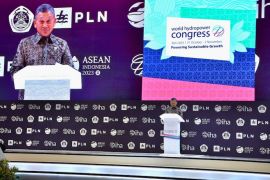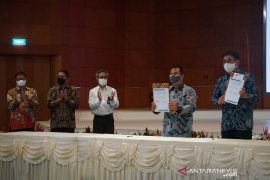Kupang, E Nusa Tenggara (Antara Bali) - The Coordinating Minister for Maritime Affairs, Luhut Pandjaitan, said that Indonesia is committed to meeting the gas emission reduction target, with 23 percent of energy mix.
"The president said we can meet the emission reduction by 23 percent as long as we take real actions and not just talk," the minister stated, at the Climate Change Conference in Bonn, Germany, as mentioned in a release received by Antara here, on Tuesday.
Indonesia, along with other 195 countries, is committed to comply with the Paris Agreement on the United Nations Framework Convention on Climate Change Conference of the Parties 23 / UNFCCC-COP 23.
The minister stated that the Indonesian government has cooperated a lot with a number of countries around the world in terms of energy.
"We have cooperated a lot with other countries in the field of renewable energy, such as solar and wind energy. The cooperation also includes efforts to reduce plastic waste in the sea by producing asphalt from plastic bags. We are also actively reducing the use of plastic bags by creating alternative plastic bags from environmentally friendly materials such as cassava and seaweed," he added.
Luhut explained that cooperation with other countries on environment preservation should meet three conditions, namely the technology must be environmentally friendly, there should be a technology transfer, and the cooperation has to develop from upstream to downstream sectors to improve added value.
The minister called on developed countries to assist Indonesia in reducing the impacts of climate change.
"Indonesia has a mangrove ecosystem of 3.1 million hectares, or 23 percent of the world's total mangrove. Therefore, if developed countries have preservation and mangrove development technology, they should share it with Indonesia," he explained.
Earlier, Luhut served as a keynote speaker at an event titled "Combating Plastic Waste in the Sea." On that occasion, the minister pointed out that 80 percent of marine plastic waste comes from land and the rest are from ships.
"Plastic wastes lead to coastal flooding, which is dangerous for transportation. They also affect tourism and destroy marine resources. Plastic waste in the ocean also damages reefs and marine life," he added.
The Indonesian government has taken some actions to reduce marine plastic waste by strengthening cooperation among ministries and agencies to protect marine ecosystems and encourage sustainable maritime economic growth in the country. (WDY)






